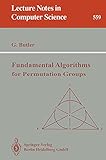Fundamental Algorithms for Permutation Groups [electronic resource] / edited by G. Butler.
Material type: TextSeries: Lecture Notes in Computer Science ; 559Publisher: Berlin, Heidelberg : Springer Berlin Heidelberg, 1991Description: XII, 244 p. online resourceContent type: text Media type: computer Carrier type: online resourceISBN: 9783540466079Subject(s): Computer science | Computer software | Algebra -- Data processing | Group theory | Combinatorics | Computer Science | Symbolic and Algebraic Manipulation | Algorithm Analysis and Problem Complexity | Combinatorics | Group Theory and GeneralizationsAdditional physical formats: Printed edition:: No titleDDC classification: 005.131 LOC classification: QA76.9.M35Online resources: Click here to access online
TextSeries: Lecture Notes in Computer Science ; 559Publisher: Berlin, Heidelberg : Springer Berlin Heidelberg, 1991Description: XII, 244 p. online resourceContent type: text Media type: computer Carrier type: online resourceISBN: 9783540466079Subject(s): Computer science | Computer software | Algebra -- Data processing | Group theory | Combinatorics | Computer Science | Symbolic and Algebraic Manipulation | Algorithm Analysis and Problem Complexity | Combinatorics | Group Theory and GeneralizationsAdditional physical formats: Printed edition:: No titleDDC classification: 005.131 LOC classification: QA76.9.M35Online resources: Click here to access online  E-BOOKS
E-BOOKS
| Current library | Home library | Call number | Materials specified | URL | Status | Date due | Barcode |
|---|---|---|---|---|---|---|---|
| IMSc Library | IMSc Library | Link to resource | Available | EBK5835 |
Group theory background -- List of elements -- Searching small groups -- Cayley graph and defining relations -- Lattice of subgroups -- Orbits and schreier vectors -- Regularity -- Primitivity -- Inductive foundation -- Backtrack search -- Base change -- Schreier-Sims method -- Complexity of the Schreier-Sims method -- Homomorphisms -- Sylow subgroups -- P-groups and soluble groups -- Soluble permutation groups -- Some other algorithms.
This is the first-ever book on computational group theory. It provides extensive and up-to-date coverage of the fundamental algorithms for permutation groups with reference to aspects of combinatorial group theory, soluble groups, and p-groups where appropriate. The book begins with a constructive introduction to group theory and algorithms for computing with small groups, followed by a gradual discussion of the basic ideas of Sims for computing with very large permutation groups, and concludes with algorithms that use group homomorphisms, as in the computation of Sylowsubgroups. No background in group theory is assumed. The emphasis is on the details of the data structures and implementation which makes the algorithms effective when applied to realistic problems. The algorithms are developed hand-in-hand with the theoretical and practical justification.All algorithms are clearly described, examples are given, exercises reinforce understanding, and detailed bibliographical remarks explain the history and context of the work. Much of the later material on homomorphisms, Sylow subgroups, and soluble permutation groups is new.


There are no comments on this title.